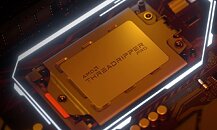- Joined
- Aug 19, 2017
- Messages
- 2,962 (1.06/day)
AMD Ryzen Threadripper Pro 5000 series processors have been available since March in Lenovo systems. In the meantime, system integrators and OEMs got their hands on these processors and started selling systems based around them. However, today the DIY channel is equipped with these monstrous CPUs. With up to 64 cores and 128 threads of Zen3 IP, these processors can boost up to 4.5 GHz and have 128 PCIe 4.0 lanes and an eight-channel DDR4 integrated memory controller with 280 Watt TDP across all models. AMD has noted that the non-Pro Threadripper 5000 series is ceasing production in favor of these Pro models and justifying the increased price point by adding more L3 cache and more cores.
The 24C/48T Threadripper Pro 5965WX comes with a 3.8 GHz base and 4.5 GHz boost frequency with 128 MB of L3 cache, and it is priced at 2399 USD. The bigger Threadripper Pro 5975WX is equipped with 32C/64T configuration, has a 3.6 GHz base and 4.5 GHz boost speed, and carries 128 MB of L3 cache while priced at 3299 USD. The top-end Threadripper Pro 5995WX is a monstrous 64C/128T design with a base frequency of 2.7 GHz and a boost of 4.5 GHz. It has 256 MB of L3 cache and costs a staggering 6499 USD. Additionally, all of the new Ryzen Threadripper Pro 5000 series CPUs require a WRX80-based motherboard chipset, which is an additional expense of its own.

View at TechPowerUp Main Site
The 24C/48T Threadripper Pro 5965WX comes with a 3.8 GHz base and 4.5 GHz boost frequency with 128 MB of L3 cache, and it is priced at 2399 USD. The bigger Threadripper Pro 5975WX is equipped with 32C/64T configuration, has a 3.6 GHz base and 4.5 GHz boost speed, and carries 128 MB of L3 cache while priced at 3299 USD. The top-end Threadripper Pro 5995WX is a monstrous 64C/128T design with a base frequency of 2.7 GHz and a boost of 4.5 GHz. It has 256 MB of L3 cache and costs a staggering 6499 USD. Additionally, all of the new Ryzen Threadripper Pro 5000 series CPUs require a WRX80-based motherboard chipset, which is an additional expense of its own.

View at TechPowerUp Main Site








 heh, it was all I could go for at the time since more of the costs went into the rest of the system, particularly the graphics cards. I can't say I'm disappointed either and think I made a good choice since I wanted higher clock speeds on the CPU + more cores, and be able to upgrade to 256Gb RAM later on. I couldn't get that with an Intel CPU at the time since had I gone with Intel, it would've had to be either a gaming system or a workstation with much slower clock speeds.
heh, it was all I could go for at the time since more of the costs went into the rest of the system, particularly the graphics cards. I can't say I'm disappointed either and think I made a good choice since I wanted higher clock speeds on the CPU + more cores, and be able to upgrade to 256Gb RAM later on. I couldn't get that with an Intel CPU at the time since had I gone with Intel, it would've had to be either a gaming system or a workstation with much slower clock speeds.